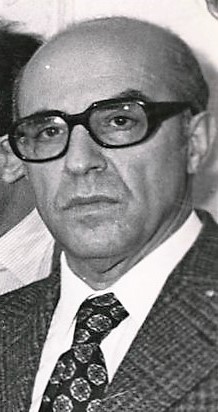Manuel Azcárate facts for kids
Quick facts for kids
Manuel Azcárate Diz
|
|
|---|---|
 |
|
| Born | 7 October 1916 Madrid, Spain
|
| Died | 24 August 1998 (aged 81) Madrid, Spain
|
| Nationality | Spanish |
| Occupation | Journalist, politician |
| Known for | Communist party leader |
Manuel Azcárate Diz (born October 7, 1916 – died August 24, 1998) was an important Spanish journalist and politician. He was a leader of the Communist Party of Spain (PCE) during the 1960s and 1970s.
Contents
Manuel Azcárate Diz: A Spanish Leader
Early Life and Education
Manuel Azcárate Diz was born in Madrid, Spain, on October 7, 1916. His family was well-known. His father, Pablo de Azcárate, worked for the League of Nations, an organization that tried to keep peace worldwide. Later, his father became Spain's ambassador in London.
Because his father worked in Geneva, Switzerland, Manuel went to an excellent school there. When he was 18, he studied at the London School of Economics in England. He then studied law and economics at the University of Madrid in Spain.
In 1934, Manuel Azcárate joined the Communist Youth. This was a group for young people who believed in communist ideas. His father supported his choice, even though they sometimes had different political views.
Fighting in the Spanish Civil War
Manuel Azcárate married Ester Jiménez, and they had two children.
The Spanish Civil War began in 1936. Manuel Azcárate fought in this war with the Republican army. He was part of the 11th division from 1937 until the war ended in 1939. Towards the end of the war, he helped with propaganda efforts in Madrid. He later wrote that people were very tired of the war and felt sad.
After the war, Manuel Azcárate went to Paris, France, to live in exile. Many leaders of the Communist Party of Spain (PCE) left France when World War II started. They moved to safer places like Mexico or the Soviet Union. However, Azcárate stayed in France. He helped to reorganize the PCE in the part of France that was controlled by the Germans during World War II.
Post-War Journalism and Politics
After World War II, Manuel Azcárate became a journalist. He wrote for several newspapers and magazines, including Mundo nuevo and Nuestra bandera. He also wrote for Mundo obrero, which was a secret newspaper.
From 1959 to 1964, he lived in Moscow, Russia. There, he helped write a history of the Communist Party of Spain. In 1964, he became a member of the PCE's main committee.
From 1968 to 1981, Azcárate was in charge of the party's international relations. This meant he dealt with how the PCE worked with other countries. He had to think about how to have peaceful relations with non-communist countries while still fighting against the government in Spain at the time. He believed that communist parties in Western Europe should work together to improve international relations.
Manuel Azcárate returned to Spain in 1976. He was arrested with other PCE members in December 1976. In 1977, he tried to become a deputy (a type of elected official) for the province of León in the first elections after Spain became a democracy again, but he did not win.
Azcárate was a supporter of "Eurocommunism." This was an idea that communist parties in Western Europe should be more independent from the Soviet Union. He even said that the Spanish Communist Party accepted the presence of US military bases in Spain and did not want to change the balance of power between the United States and the Soviet Union. He saw NATO, a military alliance, as something that helped keep Western Europe safe.
In 1981, Manuel Azcárate and other PCE leaders were removed from the party's main committee. This happened because they disagreed with the party's leader, Santiago Carrillo. Azcárate then started working for the newspaper El País as a writer and analyst for international news.
Manuel Azcárate Diz passed away from cancer on August 24, 1998, in Madrid. He was 81 years old.
See also
 In Spanish: Manuel Azcárate para niños
In Spanish: Manuel Azcárate para niños
 | Delilah Pierce |
 | Gordon Parks |
 | Augusta Savage |
 | Charles Ethan Porter |

